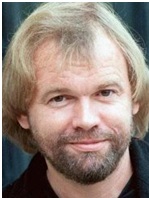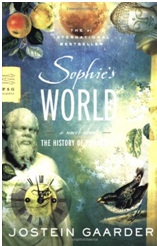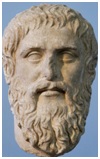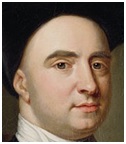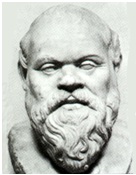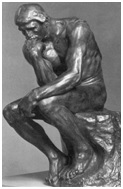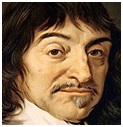|
 |
|
 |
Sophie’s World - Philosophy and Happiness
Sophie’s World (1991)
Written by the Norwegian, Jostein Gaarder (1952- ), pictured right.
Fun facts A worldwide best-selling novel that tells the history of Western philosophy through the eyes of an imaginary Norwegian teenager, Sophie.
Key characters Sophie (Amundsen), a Norwegian teenager. Alberto Knox, her philosophy lecturer. Hilde Knag, a teenage girl. Albert Knag, Hilde’s father.
The story Sophie, aged 14, receives two notes in her mailbox, saying: ‘Who are you?’ ‘Where does the world come from?’ Other philosophical questions follow. She is convinced of their relevance to her life by the note sender (Alberto Knox) who;
He discusses:
Alberto values anybody who questions themselves and the world around them, because
this is central to philosophy and a good life Sophie becomes confused when she finds mail addressed to a girl, Hilde Knag (who is the same age) and a scarf with her name on it. One postcard tells Hilde that one day she will meet Sophie. On her fifteenth birthday, Hilde receives a book,Sophie’s World, from her father, Albert Knag, which he has written for her to explain Western philosophy. Hilde finishes reading this just as Sophie and Alberto finish their philosophy course
and disappear. Alberto had told Sophie that they had only existed in Albert's mind (similar to the Anglo-Irish philosopher, George Berkeley's pictured right idea that perhaps we exist only in the mind of God). Despite their disappearance, Alberto and Sophie’s spirit (and influence on Hilde) live on.
Lessons for philosophy and happiness
1. Always ask and answer the right questions Vital questions are:
Sophie and Hilde discover that necessary for a good and happy life are:
2. Philosophy is fun Sophie and Hilde’s passion for new philosophical knowledge increases as they discover its
3. Accept your own ignorance Like the Greek philosopher, Socrates (pictured right), Sophie believes that to be wise you must accept that you know nothing.
4. Learning requires understanding Sophie and Hilde learn the uselessness of:
They must:
5. Perception is important Sophie and Alberto aren’t real people, but their influence is perceived by Hilde and her father. 6. Thinking makes you human Alberto teaches Sophie the idea of the French philosopher, René Descartes (pictured right), that the ability to think is the most important and essential thing that anyone possesses.
7. Free will can conquer fate Sophie and Alberto escape their fate of remaining in Hilde’s father’s imagination by having a real influence on Hilde’s life through their spiritual presence.
8. Continually search for wisdom Sophie and Hilde discover that you must:
Key quotes on philosophy and ethics Philosophers ... believe that man cannot live by bread alone, Alberto. Acting responsibly is not a matter of strengthening our reason but of deepening our feelings for the welfare of others, Alberto. The important thing is not what you may think is precisely right or wrong. What matters is that you choose to have an opinion at all on what is right or wrong, Alberto. Common sense and conscience can both be compared to a muscle. If you don’t use a muscle, it gets weaker and weaker, Sophie.
Key quote on religion Faith is the most important factor in religious questions, Alberto. It is more important to accept each other’s beliefs than to ask why everyone does not believe the same thing,
Sophie
True enlightenment to man is like sunlight to the soul, (poetry on the first page of Sophie’s book)
Key quote on death You can’t experience being alive without realizing that you have to die, she (Sophie) thought. But it’s just as impossible to realize you have to die without thinking how incredibly amazing it is to be alive.
Key quote on strategy The reasonable is that which is viable.
Two literature websites to recommend 1. sparknotes.com 2. litcharts.com |
|
|
||
|
|
|
||
|
||
| Copyright © wisdomtowin.com All Rights Reserved | ||
|

